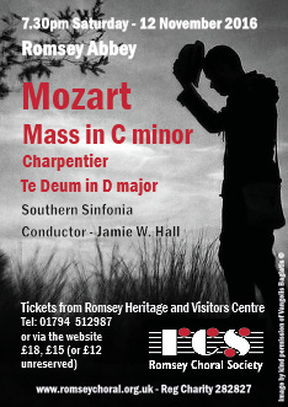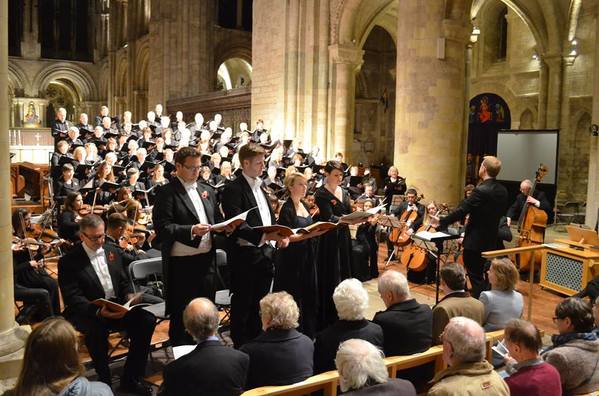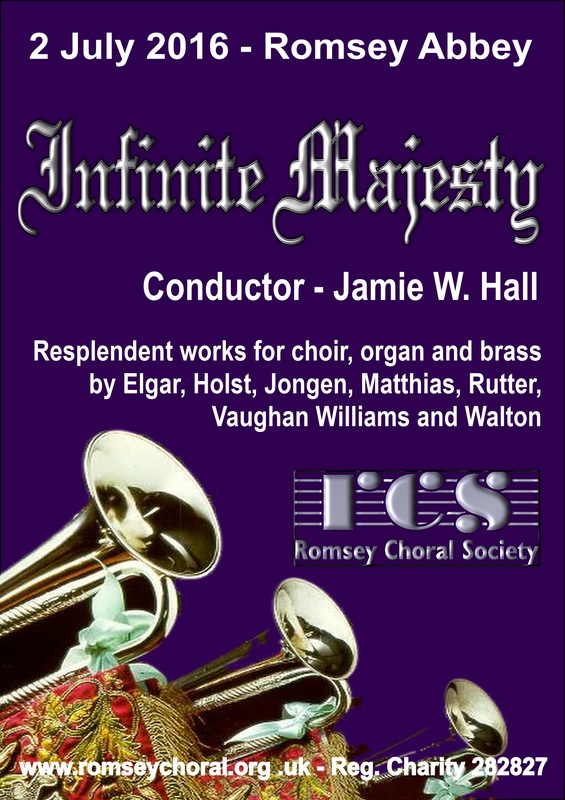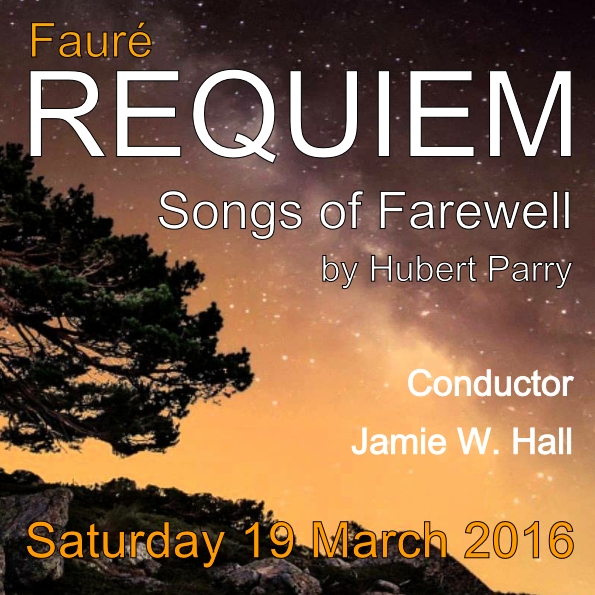Concert Reviews 2016
Concert Review - 12 November 2016 - Trumpets Resound in Romsey Abbey
A capacity audience gathered in the abbey for Romsey Choral Society’s Remembrance Day concert. Councillor Karen Hamilton, Mayor of Test Valley and her consort and Councillor John Parker, Mayor of Romsey and the Lady Mayoress were in attendance.
The concert opened with Marc Antoine Charpentier’s, Te Deum. This grand work was said to have been inspired by Louis the fourteenth’s victory over the Dutch in 1679. The whole work is in shining D major and although it is a religious work, it is infused with militaristic triumphalism
The soloists for this work included countertenor James Hall who sang with great control and beauty of tone. The soprano soloist, Emma Tring, excelled in her solo, singing with a clear vibrato free quality. The bass, Colin Campbell throughout the evening provided an object lesson in how to perform oratorio, from his perfect stance to his magisterial delivery. He was the perfect singer to deliver the authoritative line in this work: “We believe that thou shalt come to be our judge”. The engaging tenor Gareth Treseder and the creamy-toned mezzo-soprano, Siân Menna, completed a superb line-up of soloists. The choir responded to the springy baroque rhythms and wonderful dance tempos to give an enjoyable performance of this seldom heard work.
Mozart’s Mass in C minor is an incomplete work. Mozart had vowed to write a mass when he had led his beloved, Constanze to the altar. After his marriage, he writes to tell his father Leopold in 1783 that he has completed “half a mass”. He never finishes it. Attempts have been made to re-construct it, but the version that was performed by the Romsey Choral Society was the sublime torso of Mozart’s projected work.
The choir and soloists and orchestra excelled in this difficult work bringing out all its grandeur and solemnity. The soprano and mezzo-soprano soloists displayed their virtuosity in their arias, Et Incarnatus Est and Laudamus Te. The former was sensitively accompanied by flute and oboe. In the ensembles the soloists responded well to one another producing ever more beautifully shaped melodic lines.
The choir immediately engaged the audience’s attention with a dramatic account of the Kyrie. They sustained the high drama and grandeur of this work in the Qui Tollis and the Sanctus producing a rich, well-balanced sound for the many full-voiced passages. They gave a detailed account of the difficult fugal, Cum Sancto Spiritu before launching into the joyful Hosanna. This really was the music of angels dancing on pins.
The Southern Sinfonia (Leader Richard Smith) were at all times sensitive to the need for the soloists and choir to be heard. All sections of the sinfonia played exceptionally well, but special mention needs to be made of the brass section; the trombonists and trumpeters who played with impeccable precision and elan.
Jamie W. Hall, the conductor was yet again an inspiration to the choir and the orchestra. He conveys his vision of how the music should be expressed through his entire being. His encouraging, uplifting demeanour and clear, detailed direction brought out the very best in all the performers and gave the audience a night to remember.
Review by Carol Bishop
A capacity audience gathered in the abbey for Romsey Choral Society’s Remembrance Day concert. Councillor Karen Hamilton, Mayor of Test Valley and her consort and Councillor John Parker, Mayor of Romsey and the Lady Mayoress were in attendance.
The concert opened with Marc Antoine Charpentier’s, Te Deum. This grand work was said to have been inspired by Louis the fourteenth’s victory over the Dutch in 1679. The whole work is in shining D major and although it is a religious work, it is infused with militaristic triumphalism
The soloists for this work included countertenor James Hall who sang with great control and beauty of tone. The soprano soloist, Emma Tring, excelled in her solo, singing with a clear vibrato free quality. The bass, Colin Campbell throughout the evening provided an object lesson in how to perform oratorio, from his perfect stance to his magisterial delivery. He was the perfect singer to deliver the authoritative line in this work: “We believe that thou shalt come to be our judge”. The engaging tenor Gareth Treseder and the creamy-toned mezzo-soprano, Siân Menna, completed a superb line-up of soloists. The choir responded to the springy baroque rhythms and wonderful dance tempos to give an enjoyable performance of this seldom heard work.
Mozart’s Mass in C minor is an incomplete work. Mozart had vowed to write a mass when he had led his beloved, Constanze to the altar. After his marriage, he writes to tell his father Leopold in 1783 that he has completed “half a mass”. He never finishes it. Attempts have been made to re-construct it, but the version that was performed by the Romsey Choral Society was the sublime torso of Mozart’s projected work.
The choir and soloists and orchestra excelled in this difficult work bringing out all its grandeur and solemnity. The soprano and mezzo-soprano soloists displayed their virtuosity in their arias, Et Incarnatus Est and Laudamus Te. The former was sensitively accompanied by flute and oboe. In the ensembles the soloists responded well to one another producing ever more beautifully shaped melodic lines.
The choir immediately engaged the audience’s attention with a dramatic account of the Kyrie. They sustained the high drama and grandeur of this work in the Qui Tollis and the Sanctus producing a rich, well-balanced sound for the many full-voiced passages. They gave a detailed account of the difficult fugal, Cum Sancto Spiritu before launching into the joyful Hosanna. This really was the music of angels dancing on pins.
The Southern Sinfonia (Leader Richard Smith) were at all times sensitive to the need for the soloists and choir to be heard. All sections of the sinfonia played exceptionally well, but special mention needs to be made of the brass section; the trombonists and trumpeters who played with impeccable precision and elan.
Jamie W. Hall, the conductor was yet again an inspiration to the choir and the orchestra. He conveys his vision of how the music should be expressed through his entire being. His encouraging, uplifting demeanour and clear, detailed direction brought out the very best in all the performers and gave the audience a night to remember.
Review by Carol Bishop
|
Concert Review - 2 July 2016
Romsey Choral Society were joined by the City of Southampton Orchestra’s brass ensemble for their summer concert in Romsey Abbey on Saturday. In a programme designed to showcase primarily British 20th century composers, this was both a homage to HM Queen Elizabeth's 90th birthday celebrations and an opportunity to perform glorious settings of the (biblical) King David's songs. Many of the giants of British music were featured. Mathias, Vaughan Williams and Walton led the way; complex rhythms and dense liturgical ideas were swept along and interspersed by moments of calm reflection. A wise inclusion of a popular piece by our much loved John Rutter provided a great counterbalance to the earlier works. A superb rendition of Elgar's 'Great is the Lord' featured the expertise of Richard Pearce on the organ specially built for the concert by the local firm, Romsey Organ Works. The interplay between choir and organ left a charged atmosphere at the closing refrain 'For this is our God forever and ever; He will be our guide even unto death.' RCS have performed many times in Romsey Abbey since their formation in 1981, and are ably led by their talented musical director, BBC Singer and composer, Jamie W. Hall. The repertoire for the event presented a number of technical challenges. How could the brass/ organ/ choir reach a reasonable balance? Would the performance of the newly rediscovered Jongen Mass engage the local audience? RCS have an innate confidence, and their skill at handling new material shone through in the second half. The Mass Opus 130 by Belgian composer Joseph Jongen was handled sensitively; the bass component of the choir worked well together, particularly in the Agnus Dei. The Mass was a big ask for this medium sized choir, but the overall performance was well articulated and charged with meaning. Review by Lynne Smith |
Concert Review - 19 March 2016
Once again, Romsey Choral Society gave a superb account of music that was both technically demanding and of sustained interest and pleasure to the listener. As we have come to expect from these singers, the attention to detail lifted this performance to a level rarely experienced in the world of choral societies. The intonation and the diction, in particular, were of the highest standard, and the overall sound was magnificent. Two members of the choir told me independently that the Music Director and Conductor, Jamie W. Hall, is a hard task-master; this being the case, it certainly paid off on this occasion. The programming was also adventurous, the first half featuring Parry’s Songs of Farewell. I had not heard these six songs before, although I was aware that only the bravest of choirs tackle all six: the final two songs are particularly challenging for any group of singers. For me, the performance was a revelation; and it was clear that my enthusiasm for both the music and the performance was shared by the audience as a whole. The flowing lines and varied textures of the first three songs were beautifully judged by the singers and the increasing density of the final three songs was superbly handled. The final song, in particular, where the effect is of two choirs singing, was a joy to experience, despite the solemnity of the text, Lord, let me know mine end. It would be wonderful to hear these songs more frequently but their difficulty means that performances are rare. So, well done, Romsey Choral Society for rising so ably to this challenge! The second half of the concert comprised Fauré’s Requiem. This is, of course, a standard repertoire piece for most choirs. Nevertheless, the performance was fresh and stimulating, with not a hint of the ‘ennui’ that can creep into such familiar works. In particular, the Sanctus and In Paradisum, which are in some ways technically less demanding and therefore often rather casually treated, were beautifully sung. I would go so far as to say that I have never heard them sung so movingly and so effectively. The more dramatic and dynamically diverse sections of the Requiem, notably the Agnus Dei, were very powerfully delivered. The accompaniment of violin, cello, harp and organ was perfect and at no stage did I feel the absence of the standard full orchestra. The three solo singers – a soprano and two basses drawn from the choir – were very good indeed. Although selecting a single one from a group of three is often considered an invidious practice, I feel that I must mention Karen Trewinnard, whose account of the Pie Jesu was outstanding. The whole performance was certainly far above the average: there was nothing ‘standard’ about this repertoire. The concert ended with Parry’s Crossing the Bar, a moving and eloquent setting of Tennyson’s poem of that name. This evening’s concert had been dedicated to the memory of Peter Coulson, a well-loved former member of the Choral Society. Members of the Society had sung Crossing the Bar at Peter’s funeral in January. This short but very poignant piece very cogently rounded off an extremely memorable evening. Review by Thomas More Hagger |




